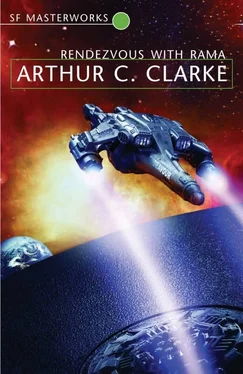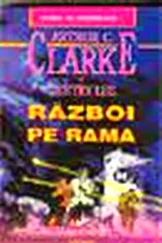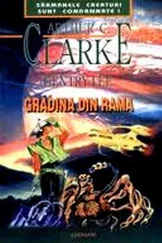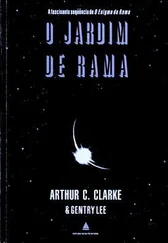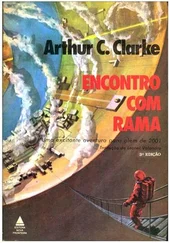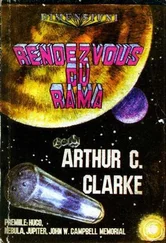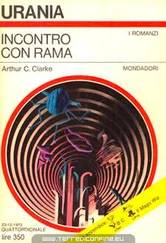And probably they felt exactly the same way about him…
The Rama Committee was still manageably small, though doubtless that would soon be rectified. His six colleagues—the UP representatives for Mercury, Earth, Luna, Ganymede, Titan and Triton—were all present in the flesh. They had to be; electronic diplomacy was not possible over solar system distances. Some elder statesmen, accustomed to the instantaneous communications which Earth had long taken for granted, had never reconciled themselves to the fact that radio waves took minutes, or even hours, to journey across the gulfs between the planets. “Can’t you scientists do something about it?” they had been heard to complain bitterly, when told that face-to-face conversation was impossible between Earth and any of its remoter children. Only the Moon had that barely acceptable one-and-a-half-second delay—with all the political and psychological consequences which it implied. Because of this fact of astronomical life, the Moon—and only the Moon—would always be a suburb of Earth.
Also present in person were three of the specialists who had been co-opted to the Committee. Professor Davidson, the astronomer, was an old acquaintance; today, he did not seem his usual irascible self. Dr. Bose knew nothing of the infighting that had preceded the launch of the first probe to Rama, but the Professor’s colleagues had not let him forget it.
Dr. Thelma Price was familiar through her numerous television appearances, though she had first made her reputation fifty years ago during the archaeological explosion that had followed the draining of that vast marine museum, the Mediterranean.
Dr. Bose could still recall the excitement of that time, when the lost treasures of the Greeks, Romans and a dozen other civilizations were restored to the light of day. That was one of the few occasions when he was sorry to be living on Mars.
The exobiologist, Carlisle Perera, was another obvious choice; so was Dennis Solomons, the science historian. Dr. Bose was slightly less happy about the presence of Conrad Taylor, the celebrated anthropologist, who had made his reputation by uniquely combining scholarship and eroticism in his study of puberty rites in late twentieth-century Beverly Hills.
No one, however, could possibly have disputed the right of Sir Lewis Sands to be on the Committee. A man whose knowledge was matched only by his urbanity, Sir Lewis was reputed to lose his composure only when called the Arnold Toynbee of his age.
The great historian was not present in person; he stubbornly refused to leave Earth, even for so momentous a meeting as this. His stereo image, indistinguishable from reality, apparently occupied the chair to Dr. Bose’s right; as if to complete the illusion, someone had placed a glass of water in front of him. Dr. Bose considered that this sort of technological tour de force was an unnecessary gimmick, but it was surprising how many undeniably great men were childishly delighted to be in two places at once. Sometimes this electronic miracle produced comic disasters; he had been at one diplomatic reception where somebody had tried to walk through a stereogram—and discovered, too late, that it was the real person. And it was even funnier to watch projections trying to shake hands…
His Excellency the Ambassador for Mars to the United Planets called his wandering thoughts to order, cleared his throat, and said: “Gentlemen, the Committee is now in session. I think I am correct in saying that this is a gathering of unique talents, assembled to deal with a unique situation. The directive that the Secretary-General has given us is to evaluate that situation, and to advise Commander Norton when necessary.”
This was a miracle of over-simplification, and everyone knew it. Unless there was a real emergency, the Committee might never be in direct contact with Commander Norton—if, indeed, he ever heard of its existence. For the Committee was a temporary creation of the United Planets’ Science Organization, reporting through its Director to the Secretary-General. It was true that the Space Survey was part of the UP—but on the Operations, not the Science side. In theory, this should not make much difference; there was no reason why the Rama Committee—or anyone else for that matter—should not call up Commander Norton and offer helpful advice.
But Deep Space Communications are expensive. Endeavour could be contacted only through PLANETCOM, which was an autonomous corporation, famous for the strictness and efficiency of its accounting. It took a long time to establish a line of credit with PLANETCOM; somewhere, someone was working on this; but at the moment, PLANETCOM’s hard-hearted computers did not recognize the existence of the Rama Committee.
“This Commander Norton,” said Sir Robert Mackay, the Ambassador for Earth. “He has a tremendous responsibility. What sort of person is he?”
“I can answer that,” said Professor Davidson, his fingers flying over the keyboard of his memory pad. He frowned at the screenful of information, and started to make an instant synopsis.
“William Tsien Norton, Born 2077, Brisbane, Oceana. Educated Sydney, Bombay, Houston. Then five years at Astrograd, specializing in propulsion. Commissioned 2102. Rose through usual ranks—Lieutenant on the Third Persephone expedition, distinguished himself during fifteenth attempt to establish base on Venus… um um… exemplary record… dual citizenship, Earth and Mars… wife and one child in Brisbane, wife and two in Port Lowell, with option on third…”
“Wife?” asked Taylor innocently.
“No, child of course,” snapped the Professor, before he caught the grin on the other’s face. Mild laughter rippled round the table, though the overcrowded terrestrials looked more envious than amused. After a century of determined effort, Earth had still failed to get its population below the target of one billion…
“…appointed commanding officer Solar Survey Research Vessel Endeavour. First voyage to retrograde satellites of Jupiter… um, that was a tricky one… on asteroid mission when ordered to prepare for this operation… managed to beat deadline…”
The Professor cleared the display and looked up at his colleagues.
“I think we were extremely lucky, considering that he was the only man available at such short notice. We might have had the usual run-of-the-mill captain.” He sounded as if he was referring to the typical peg-legged scourge of the spaceways, pistol in one hand and cutlass in the other.
“The record only proves that he’s competent,” objected the Ambassador from Mercury (population: 112,500 but growing). “How will he react in a wholly novel situation like this?”
On Earth, Sir Lewis Sands cleared his throat. A second and a half later, he did so on the Moon.
“Not exactly a novel situation,” he reminded the Hermian, “even though it’s three centuries since it last occurred. If Rama is dead, or unoccupied—and so far all the evidence suggests that it is—Norton is in the position of an archaeologist discovering the ruins of an extinct culture.” He bowed politely to Dr. Price, who nodded in agreement. “Obvious examples are Schliemann at Troy or Mouhot at Angkor Vat. The danger is minimal, though of course accident can never be completely ruled out.”
“But what about the booby-traps and trigger mechanisms these Pandora people have been talking about?” asked Dr. Price.
“Pandora?” asked the Hermian Ambassador quickly. “What’s that?”
“It’s a crackpot movement,” explained Sir Robert, with as much embarrassment as a diplomat was ever likely to show, “which is convinced that Rama is a grave potential danger. A box that shouldn’t be opened, you know.” He doubted if the Hermian did know: classical studies were not encouraged on Mercury.
Читать дальше
